We are the most honored band that has stepped on this planet in millions of years, and we are not honored"
Eskorbuto are born on the left bank of the Nervión River, specifically in the coastal town of Santurce in the early 80. Retrotrayéndonos at that time, the situation of the left bank-most workers ' villages-was quite bad due to the process of industrial restructuring that brought with it the closure of many companies which meant a high rate of unemployment in the area. Its aftermath was a strong marginalization, a social destructuring that made the inequalities more evident on both sides of the nervión. On the other hand the violence in the area was in one of its highest points, the terrorist group Euskadi Ta Askatasuna (P.W.T.P.) was at its peak and the war was born dirty. It is important to know all this sociopolitical context in order to understand the letters of the group as a whole.
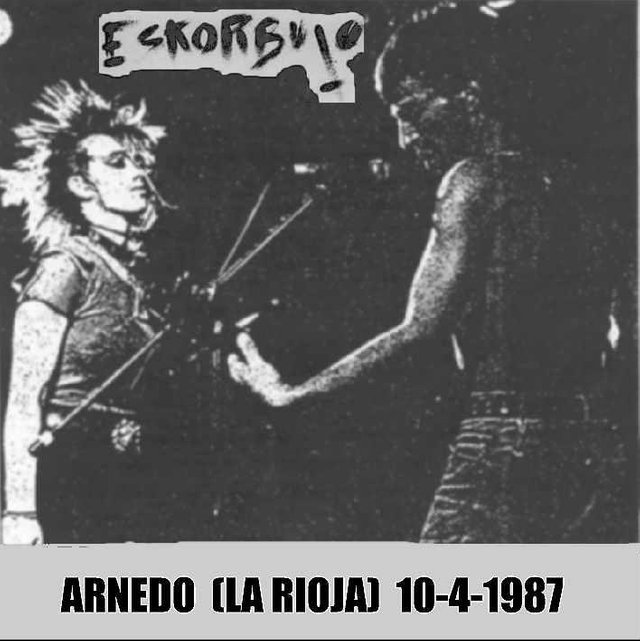
With this panorama, two twenty decide to assemble a group, were Jesús María Expósito López, better known by Iosu and who had been bassist of Zarama, and Juan María Suárez Fernandez, also known by Juanma or Jualma. During the first years they have different people to complete the training until one day an individual who says he knows how to play the battery, the test and is automatically integrated into the group. It was Francisco Galán Portillo, better known by Pako. Already concretized the formation of the group was missing a name, some were shuffled like steel dolls, in homage to New York Dolls, or funeral section, but in the end an ex-mate of Iosu in Zarama, Roberto Moso, puts them eskorbuto because of its starving aspect. While the three were together the group lived a permanent duality between Iosu and Juanma, the first fan of the Who and Sex Pistols, more partisan of political issues while the latter, although he used to listen to little music, his tastes went from ZZ Top to Motörhead and advocated more for more rough themes.
After several negotiations they manage to gather a first precarious instrument and to be able to rent a Lonja in the Barrio San Juan to be able to rehearse in conditions. They soon get their first gig at a school party in their natal Santurce; When they came out to play, they realized that their first audience was a child of about ten years. After some other concert record their first model and decide to move it through Madrid to try to get a contract with a stamp, they get it and launch their first single, "A lot of police, little fun" (Spanlus, 1983), a topic with which they reach popularity and that would become one of their themes of bedside.
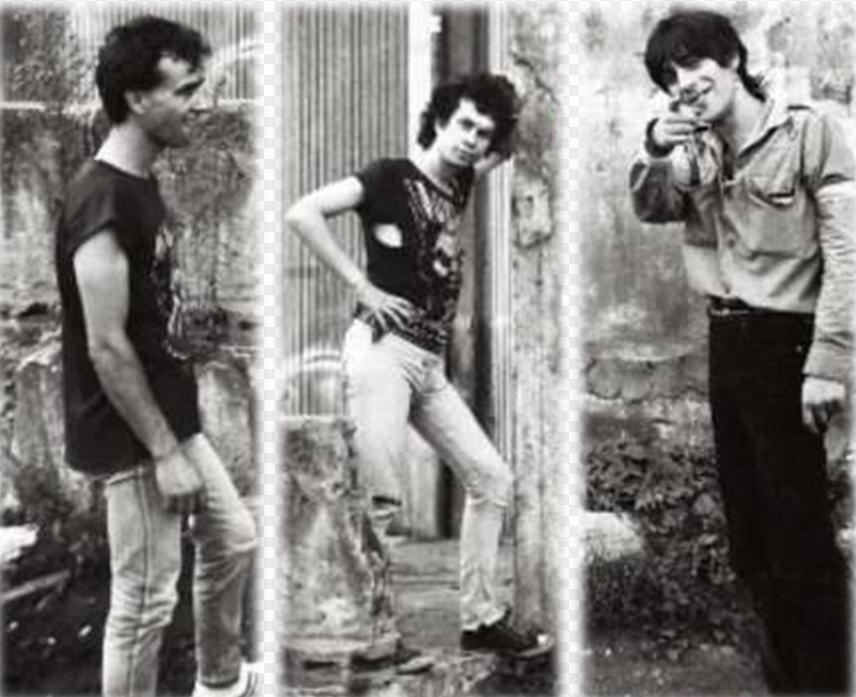
The following year they repeat play: they record a new model and go back to Madrid PEO the end was quite different. In the middle of the road the national police stopped them to see the names of the songs on the scale, songs such as "Spits the flag", "Damn Country" or "P.W.T.P." stop them and are accused of insulting the state. They are enforced by the anti-terrorism law and remain locked up for a few hours, but at that time they receive support from all parts of the country, less of the Basque Country, whose pro-amnesty managers made deaf ears and the group felt abandoned. This fact marked them on fire all their lives. And still recent the issue go to record some loose themes that would end up included in a split together with the group R.I.P., "Special Zone North" (Spansuls, 1984). It did not have a good distribution but it was not prevent to accuse the group of traitor to include among their subjects some as "fuck the Basque Country" where they adjusted accounts with those who had abandoned them and began their bad reputation. As a result they stopped inviting the Martxa ETA Borroka organized by the left Abertzale and suffered the veto of the related media.
Despite all this they manage to record their first official album "Eskizofrenia" (Twins, 1985). Most of the topics can be found in the models but for their debut they record them again, forming a dense disc that improves in production but that continues to sound too fast. The album was not successful as the label did not move too much to advertise it. But they had a moment for redemption, José Mari Blasco creates the Soñua label to welcome the groups of the so-called rock Radikal Vasco and offers the Eskorbuto to be part of the label. His answer is clear: "Rock has no homeland, not even Basque." They regarded the label as a commercial and political montage and after their refusal to become part of the label they were cursed.
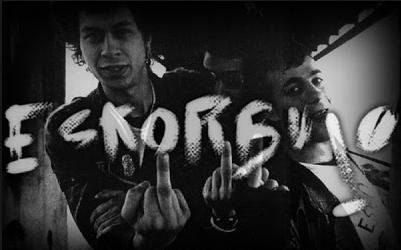
But as the great groups were overcome by the difficulties and with everything against they brought out the best they had inside and recorded their work summit "anti Todo" (Suicide Discs, 1986), one of the jewels of Spanish punk in all its history. That same year gave for much more; They recorded a cassette for a fanzine with a very limited circulation under the name of "No more balls left," Eskorbuto to the elections "(Suicide Discs, 1986) and, to finish the year, they record the direct" revolutionary tax "(DRO, 1986) with a concert given at an institute in their natal Santurce. Despite having originally rights the label suicide discs, in the end is Dro who distributes it, after payment corresponding to both parties, as he was quite interested in entering the punk made in the Basque Country.
After such a busy year they record their most ambitious project, "The Insane Accelerated boys" (Suicide Discs, 1987), an opera-rock'n ' roll in image and likeness of the "Quadrophenia" (track, 1973), of his adored the WHO, but here the story is of an unscrupulous boy who seeks to reach power at all costs, above all and all. A conceptual album that out against any dictatorial policy. In a twist of Eskorbuto, steal a copy of the master and sell it to the label twins, and in a few months will go to the market "the Insane Accelerated Boys" (twins, 1988) whose only difference is the image of the cover.
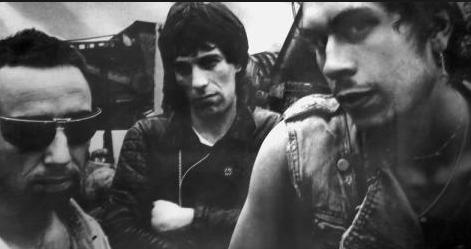
Tired of the problems with the labels decide to create their own label, Butoeskor, with the intention of editing and distributing their future works. Thus comes "the most macabre of the lives" (Butoeskor, 1988) where they are leaving aside the most political issues to enter its darkest phase, death opens its way in disappointing and desolate subjects where the fatigue is palpable both physical and mental of the group. The heroin addiction of iosu and Juanma leaves them quite depleted; In the following years they rehearse little and play less, often they call Iñaki-Gato-(ex speed) to replace one of the two and rumors of dissolution and even the death of some of the components is triggered. But which Phoenix are reborn and recorded "Too Many Enemies" (Matraka, 1991), which would be the last album with the original formation to complete as soon after Iosu dies. Despite this the other two components decide to go ahead and recruit guitarists Urko Igartiburu (ex Tiananmen) and Jointer (Eskombro). They record "Aki no Keda ni Dios" (Basati, 1994), but as the misfortunes never come alone, Juanma, with a few months apart from Iosu, also dies. Both deaths due to the aftermath of their heroin addiction.
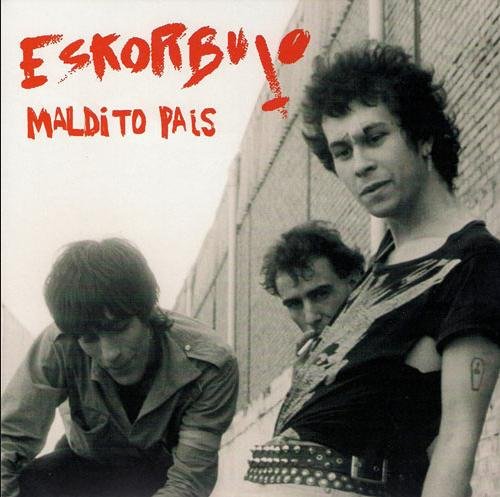
Pako continues with the adventure and records a couple of discs more: "Kalaña" (Suicide Discs, 1996) and "Dekadencia" (Furrow, 1998), with the help of the bassists Ali (Zei) and Miguel, and the voices Sergio (evil bugs). The records do not go to your audience and decide to leave it. Since that time the market has been filled with reprints of their models, their albums, direct launches, etc. Eskorbuto is still as alive today as they were at the time, vindicated by many and vilified by others, never left anyone indifferent. His lyrics impregnated with his particular philosophy remain as effective now as yesterday and today are a reference group for a generation that grew up listening to their hymns.